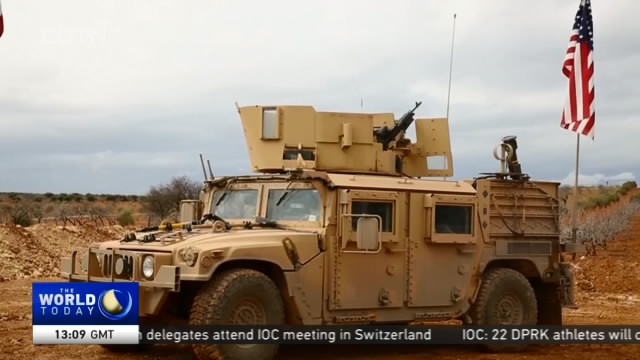
21:30, 20-Jan-2018
Trump White House: How have Trump's foreign policy moves affected the world?

One year into his presidency, President Donald Trump is busy dealing with the latest government shutdown and trading insults with the media. He has also created havoc in other parts of the world, especially in the Middle East and East Asia. Our correspondents in these regions have more on how Trump has affected their parts of the world.
JOSEPH KIM SEOUL "In the year since Trump has been elected, tensions on the Korean Peninsula have escalated to levels that some experts suggest, haven't been seen since the Korean War. From threatening the DPRK that they'd be met with 'Fire and Fury' to calling Kim Jong Un 'Little Rocket Man', Trump and his administration have only taken a hard-line approach to Pyongyang, with no active diplomacy campaign, to stating 'all options are on the table' including a military strike. This has caused alarms in South Korea, one of Washington's closest allies in Asia, because a war with the DPRK would have devastating consequences for Seoul, and discord between the two allies seems to be amounting, especially with Trump's 'America first' policy. Despite Trump's firm policy to the DPRK, Pyongyang has shown no signs of letting up, firing back at Trump, recently calling him a lunatic, while experts suggest there are signs that another missile test by Pyongyang could be imminent. Now to the Middle East, here's Stephanie Freid in Israel."
STEPHANIE FREID JERUSALEM "It started as a Donald Trump campaign promise: If elected, he told pro-Israel voters, I'll move the U.S. Embassy from Tel Aviv to Jerusalem. A year into Trump's tenure that promise is un-hinging Palestinian-Israeli relations. President Trump didn't move the embassy - yet. He recognized Jerusalem as Israel's capital - an announcement that carries tremendous political implications especially for Palestinians who regard Jerusalem or Al Quds in Arabic as the capital of a future Palestinian state. The historic announcement prompted protests throughout the region and beyond that, a month later, are ongoing. Palestinian President Mahmoud Abbas says the U.S., historically the key Israeli Palestinian peace mediator, is no longer a viable peace broker between the sides and in a recent, fiery speech the Palestinian leader openly criticized Trump and declared the peace process 'dead'. How does that match up with U.S. President Trump's repeated claim that he has quote un-quote 'the ultimate peace deal' for the sides? One year into his tenure, that claim is remote if not untenable."
ALAA EBRAHIM DAMASCUS, SYRIA "Do not attack Syria. If you do, many very bad things will happen. This is what Donald Trump tweeted to then President Barack Obama in September 2013. Trump was warning against an American strike on Syria, following a chemical weapons attack blamed on Syrian President Bashar al-Assad. Perhaps, this why Syria's foreign minister told other cabinet members in a briefing in late 2016 that Trump in the White House was a better choice for Damascus than Hillary Clinton. Soon after, winds shifted after another chemical attack on the town of Khan Sheikhoun in April 2017. The U.S. blamed Damascus. Trump ordered a missile strike. Fifty-nine tomahawk missiles hit the Al Shayrat base in central Syria—the airfield from which Syria allegedly launched the attack. It was Trump's first direct message to Assad. Meanwhile, the U.S. was actively helping mainly Kurdish militias the Syrian Democratic Forces, or SDF. Russia was already helping Syrian government forces. Both working against ISIL. By the end of 2017, the radical group had lost all of its Syrian strongholds. And though it was never confirmed publicly, the SDF and the Syrian army kept away from each other in what many believed to be the result of U.S.-Russian coordination. Now, the U.S.-led coalition says it will be forming a 30-thousand strong border guard unit to keep ISIL out of Syria. Kurdish militias will be the core of this new force. If the U.S. moves forward with this plan, Turkey's foreign minister said Ankara's relationship with Washington would be, quote irreversibly harmed."

SITEMAP
Copyright © 2018 CGTN. Beijing ICP prepared NO.16065310-3
Copyright © 2018 CGTN. Beijing ICP prepared NO.16065310-3